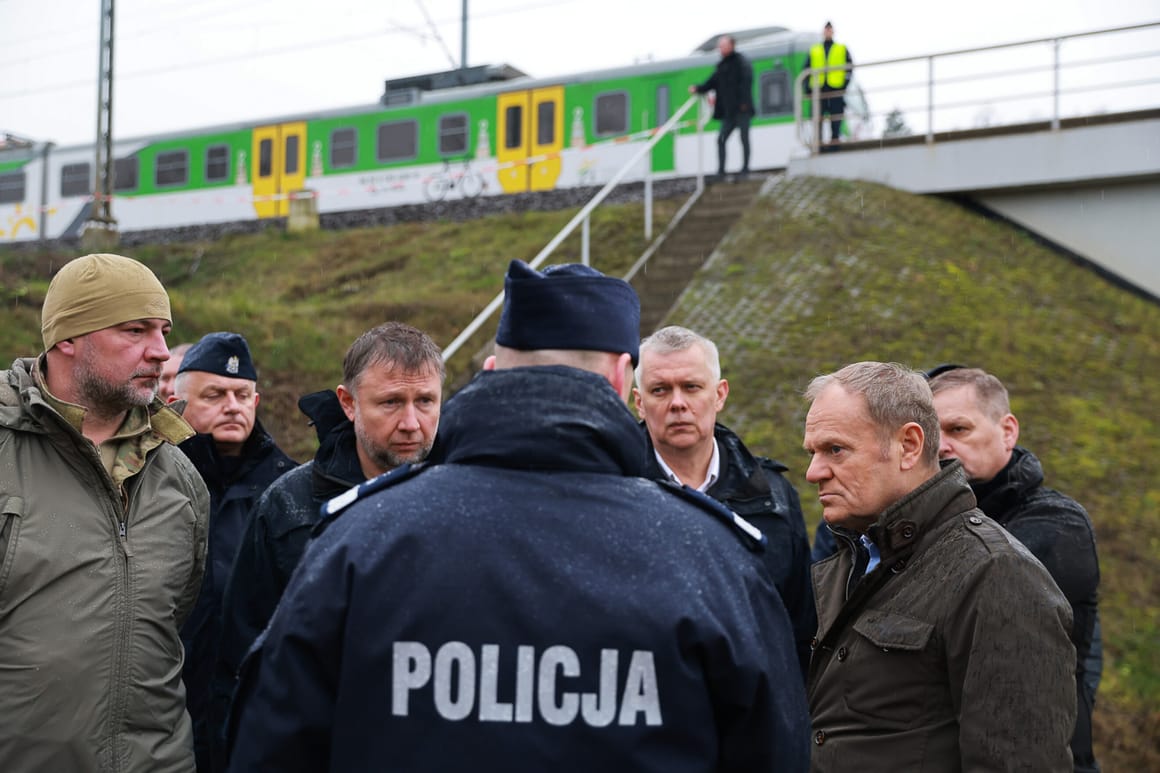Politics
Polish PM Confirms Sabotage in Rail Track Explosion Near Lublin

A rail line connecting Warsaw to Lublin and extending towards Ukraine was severely damaged on Sunday, leading to a significant disruption in train services. Prime Minister Donald Tusk described the incident as an “act of sabotage,” indicating that authorities believe the damage was intentional. The attack has raised alarms about the security of Poland’s infrastructure amid ongoing tensions related to Russia’s invasion of Ukraine.
Train traffic along the busy route was halted early on Sunday after the driver of a high-speed Intercity train reported visible damage to the line. Tusk confirmed on Monday that a section of the track had been destroyed by an explosive device, stating, “Unfortunately, the worst suspicions have been confirmed. An act of sabotage occurred on the Warsaw-Lublin line, near the village of Mika.” He added that emergency services and prosecutors are currently investigating the site, where additional damage has also been identified.
While Tusk did not directly accuse any party of responsibility, he linked the incident to the broader context of Russia’s aggression in Ukraine. He emphasized the importance of the Warsaw-Lublin route, noting, “This route is also crucially important for delivering aid to Ukraine. We will catch the perpetrators, whoever they are.”
Authorities Respond to the Attack
Maciej Duszczyk, Poland’s deputy interior minister, cautioned against hastily attributing blame to Russia. He stated, “Russia is not so powerful that every arson attack, every situation of this kind, is provoked by Russia. However, this cannot be ruled out or dismissed in any way.”
The Warsaw-Lublin line is one of the busiest in Poland, facilitating transport between the capital and eastern regions, including routes towards Ukraine. Despite the damage, service will continue on parallel tracks, according to public broadcaster TVP Info.
Defense Minister Władysław Kosiniak-Kamysz announced that the Polish military will conduct examinations along the 120-kilometer stretch of track leading to the Ukrainian border. Since the onset of Russia’s full-scale attack on Ukraine in February 2022, Poland has remained vigilant against potential espionage and sabotage activities, often associated with Russia and its ally Belarus.
Authorities have arrested several individuals on suspicion of planning sabotage or surveilling critical infrastructure. In recent weeks, two Ukrainian nationals were detained on charges of espionage for a foreign intelligence service. Other incidents, including an alleged Russian operative posing as a Belarusian refugee, have heightened concerns about security.
Military and Security Implications
General Wiesław Kukuła, Poland’s chief of general staff, commented on the situation, stating, “The adversary has begun preparations for war. It is building a certain environment here that is intended to undermine public trust in the government and institutions such as the armed forces and the police. This is to create conditions conducive to potential aggression on Polish territory.”
The recent sabotage incident underscores the escalating tensions in the region and the potential threats facing Poland as it continues to provide support to Ukraine. As investigations proceed, authorities are expected to implement heightened security measures to protect critical infrastructure and ensure the safety of civilians.
-

 Top Stories2 months ago
Top Stories2 months agoTributes Surge for 9-Year-Old Leon Briody After Cancer Battle
-

 Entertainment4 months ago
Entertainment4 months agoAimee Osbourne Joins Family for Emotional Tribute to Ozzy
-

 Politics4 months ago
Politics4 months agoDanny Healy-Rae Considers Complaint After Altercation with Garda
-

 Top Stories3 months ago
Top Stories3 months agoIreland Enjoys Summer Heat as Hurricane Erin Approaches Atlantic
-

 World4 months ago
World4 months agoHawaii Commemorates 80 Years Since Hiroshima Bombing with Ceremony
-

 Top Stories2 months ago
Top Stories2 months agoNewcastle West Woman Patricia Foley Found Safe After Urgent Search
-

 Top Stories4 months ago
Top Stories4 months agoFianna Fáil TDs Urgently Consider Maire Geoghegan-Quinn for Presidency
-

 World4 months ago
World4 months agoCouple Convicted of Murdering Two-Year-Old Grandson in Wales
-

 World4 months ago
World4 months agoGaza Aid Distribution Tragedy: 20 Killed Amid Ongoing Violence
-

 World4 months ago
World4 months agoAristocrat Constance Marten and Partner Convicted of Infant Murder
-

 Top Stories4 months ago
Top Stories4 months agoClimbing Errigal: A Must-Do Summer Adventure in Donegal
-

 Top Stories4 months ago
Top Stories4 months agoHike Donegal’s Errigal Mountain NOW for Unforgettable Summer Views









